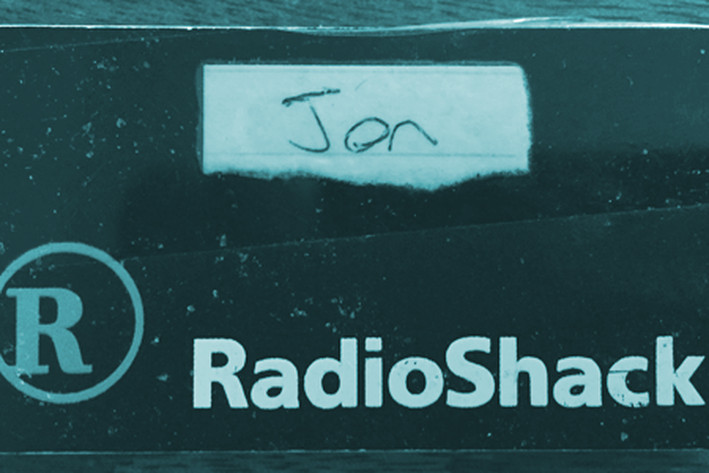A eulogy for RadioShack, The half dead Retail Empire

This may very well be RadioShack’s final holiday season. Jon, a former employee, looks back on a strange, craven, five thousand-fingered strip-mall monster from a forgotten age.
RadioShack won’t be the only store to open on Thanksgiving Day, but it might be the only one of its particular makeup to do so. This isn’t Walmart or a call center, in which volunteers who want overtime pay can be chosen first. Most RadioShack stores have just a handful of employees, most or all of whom will work Thanksgiving whether they want to or not. Retail employees have very, very little in the way of perks, of things that are understood to be sacred. Having Thanksgiving Day to themselves was one of them.
After some pushback from its employees, RadioShack gave in just a little: after originally planning to open from 8 a.m. to midnight on Thanksgiving, its stores will now close for a few hours in the middle of the day so that its folks can have a little bit of family time.
RadioShack is a company of massive real estate, and is peddling a business model that is completely unviable in 2014. It’s very likely to go extinct soon, and I doubt there’s anything its operators can do about it. In scenarios like this one, there aren’t happy stories or easy answers, and if this were any other company, I’d concede that, perhaps, opening on Thanksgiving is a regrettable but necessary stab at saving the company, employees and all.
But as this company has spent the last decade-plus trying to save itself, the happiness of the employees has always been the first to go overboard. Its store managers are worked so hard that they become unhappy, half-awake shadows of themselves. Labor laws have been brazenly ignored. Untold hours of labor haven’t been paid for (when I quit, on good terms and with two weeks’ notice, they withheld my final paychecks for months and wouldn’t tell me why). Lawyers have been sent to shut down websites that have bad things to say about RadioShack. Employees who make a few dimes over minimum wage are pressured, shamed, and yelled at as though they’re brokering million-dollar deals.
RadioShack is a rotten place to work, generally not a very good place to shop, and an untenable business to run. Everyone involved loses.
These are stories from my three and a half years as a RadioShack employee.
/cdn0.vox-cdn.com/uploads/chorus_asset/file/2491606/1.0.png)
I.
I really hope Black Fridays aren’t like they were a decade ago, but I doubt much has changed.
During the 2004 holiday season, I worked in a Radio Shack situated in a dying mall with virtually no foot traffic. It was hard enough making much in the way of commissions when the sales were split between our usual staff of three or four employees. Radio Shack is a corporation dedicated to the prolonged destruction of the individual, so it tripled our staff right before Black Friday, ensuring that no one would make any money.
And during this season, Radio Shack also decided to abandon newspaper inserts, which had always been the lifeblood of its advertising. There was no explanation given for this, but it ensured that we would make a fraction of zero money.
4:30 a.m. We show up an hour and a half before the store opens, as demanded by the district office. We stand around and do nothing.
6:00 a.m. We all line up in expectation of hordes of customers. Six on one side of the store, six on the other side, pallbearers of an invisible casket. The manager opens the doors. No one is waiting on the other end.
7:00 a.m. Nobody has walked into the store. Nobody has been seen even walking past the store. This infuriates the manager, who at this juncture elects to fire one employee, right there on the spot, because her sweater is a shade of red that is inconsistent with the dress code.
8:00 a.m. Someone almost walks in. She kind of turns toward the store, sees 11 of us just standing and staring at her, and turns a 180. Don’t blame you, ma’am.
9:00 a.m. First customer! Someone just walked in and bought a cordless phone battery. One of us would have made approximately 23 cents on the sale (18 cents after taxes), except you don’t start making any sales commission until you surpass a monthly sales figure that is usually unreachable and arbitrarily set. (I worked at Radio Shack for 43 months, and barely hit this mark once.)
12:00 p.m. We’ve sold maybe $90 worth of stuff. Two more employees walk out and don’t come back.
2:00 p.m. A couple comes in to return a pair of cell phones I sold them a couple weeks back. I received about $40 for the sale on my last paycheck, and now they will take $40 out of my next paycheck. Voiding a cell phone contract is a process that takes an hour or so of waiting on the phone and talking to three or four different gatekeepers. This time, it’s even longer, because someone errantly slapped them with a $200 cancellation fee. My manager gets wind of this and starts screaming at me: “JON, WHAT DID YOU DO? WHAT THE FUCK DID YOU DO?” She then tries to initiate a shouting match with my customers, who don’t bite.
3:00 p.m. Two more employees quit, one because the manager has refused to give her a lunch break over a 10.5-hour shift.
9:00 p.m. Mercifully, and with sales numbers that are beyond abysmal, the district office tells us to close the store and not to remain open until midnight, as planned. Someone else came in to return a phone, so my sales are now about $60 in the hole. I make $5.45 an hour, and have worked a 16.5-hour shift, so that’s about $90. Minus the $60 I’ve lost, that’s $30. So today, I have made about $1.80 per hour, for a shift of nearly 17 hours. Before taxes.
9:45 p.m. Ha ha ha ha I am still at the store, counting the money and helping clean up and such, but not getting paid for it. This is Radio Shack’s thing: if you’re working while the store’s closed, they might decide to pay you and they might not. I worked countless hours they never paid me for; this is one. We finally close up. On the way to the parking lot, I ask my manager whether I can take Christmas Eve off; this would allow me barely enough time to make the seven-hour drive home to Kentucky to see my family, then head back. She doesn’t say no. She yells no, and tells me I’m not special.
/cdn0.vox-cdn.com/uploads/chorus_asset/file/2491612/2.0.png)
II.
That story paints that store manager as the worst woman on Earth, which I swear is not true. She was at heart a good person, and had major stress/anxiety issues, and “RadioShack manager” is just about the worst position for a person with those issues (or any person). Being a manager made her miserable and unhealthy, as it tends to do to people.
I had well over a dozen different managers across my RadioShack career. One of them, who was also a friend of mine, dealt with it by getting loaded. I’d often give him rides to and from work, and on the way home, he’d ask me to swing by the gas station so he could pick up a 24-pack of Bud Light. Since I wasn’t 21, this was a pretty sweet deal. I’d drink one or two beers with him in the parking lot, and then he’d go inside and kill the rest in a single night. I should have maybe said something, or done something, but I was 20 and there were things that didn’t occur to me then.
/cdn0.vox-cdn.com/uploads/chorus_asset/file/2491616/3.0.png)
III.
Another manager of mine staggered through life in a state of perpetual exhaustion. Our entire store had exactly three employees; my co-worker and I worked 40 or 50 hours per week, and he worked a minimum of 70 if he was lucky. We often had just one employee at the store at any given time, and sometimes, when there weren’t any customers in the store, he’d take a nap in the back room. More than once, while he was back there, someone would walk in and shoplift hundreds of dollars’ worth of stuff off the shelves and walk out in plain sight.
He just didn’t give a shit. Sometimes, due to various obligations, he was working 80, 90 hours a week. He was pretty low on his hierarchy of needs: he didn’t care about selling things, or making commission, or running a good store, or climbing any kind of career ladder. He was just trying to survive. He was trying to keep being an alive person for another hour. He made $23,000 a year.
/cdn0.vox-cdn.com/uploads/chorus_asset/file/2491628/4.0.png)
IV.
He and I sometimes saw our work week increase by five to a dozen hours because of inventories. Most folks who have worked in retail are probably familiar with this. Once every couple months, we’d have to stay after hours and count inventory. The store computer would print out a novel of every single item we were supposed to have in stock, from TVs to transistors to batteries, and then we’d have to root through the entire store and make sure we had all of it.
This could mean staying until midnight on a good inventory, or staying until five in the morning, depending on how obsessive my manager happened to be. Radio Shack could very easily have scheduled these regularly and in advance, as a courtesy to its employees, but Radio Shack is a craven and unfeeling entity that issued what I can only describe as open contempt of those they employed. The higher-ups preferred to spring them on us with maybe a day’s notice.
That is a major violation of labor laws, but they didn’t care. Sometimes they’d call an hour before the store closed to let us know we were staying there until two in the morning. We could comply or be fired.
/cdn0.vox-cdn.com/uploads/chorus_asset/file/2491694/5-2.0.png)
V.
I recently bought a new phone from a Sprint employee who used to manage a Radio Shack. He told me about a time he ran his store for an entire day, 9 a.m. to 9 p.m., all by himself without a lunch break. After closing, he was told to immediately head to another store and help with their inventory. He stayed up all night doing so, then headed right back to his store for another 12-hour shift. Thirty-six hours.
/cdn0.vox-cdn.com/uploads/chorus_asset/file/2491660/6.0.png)
VI.
I am not letting up on Radio Shack, a machine that sometimes operates in a way that could be confused with malevolence, hammering away at good people until they are a heap of dust and a plastic name tag.
I am not doing this because for a time, at least, Radio Shack tried to silence employees who shared their stories online. The company was the target of a class-action suit alleging (correctly) that it failed to pay massive amounts of overtime. A forum frequented by employees, RadioShackSucks, was instrumental in rounding up those who opted in to the suit.
At this point in history, it’s inconceivable that a company would shut down an Internet forum for “defaming” them. That’s what Radio Shack tried to do, and kind of did. I am not worried about this today, because that isn’t how it works and because Radio Shack is now too half-dead to do anything about it anyway, and thank God.
/cdn0.vox-cdn.com/uploads/chorus_asset/file/2491676/7.0.png)
VII.
And when I say “thank God,” I’m also thinking of the people working there today who will probably be jobless soon. My heart breaks for them, and I hope they — like me, the guy at the Sprint store, and my friends from those days — go on to find a place that isn’t so damned miserable. Many are great, massively over-qualified people who RadioShack never deserved for a second.
Some were, uh, not. For a few months, I worked with this guy I’ll call Craig. He was a guy in his fifties who had been making lots of money growing pot out in the country until the feds busted him and took it all, and he mostly preferred to stand around and crack jokes about TV shows I’d never seen. Every day, halfway through his shift, he’d happily announce that he was going to go “take [his] medicine,” and then sit in his car and get extraordinarily stoned and become Stoned Craig.
Stoned Craig would turn the volume all the way up on the Casio keyboards and just bang away at the keys. He didn’t play music, it was just a bunch of BLONK BLONK BLONK BLONK, but he was having the sort of good time you and I might not be able to understand.
/cdn0.vox-cdn.com/uploads/chorus_asset/file/2491670/8.0.png)
VIII.
Stoned Craig was considerably more skilled with the talking picture frames we’d always have on display: you pushed a button on the picture frame, and it’d play a pre-recorded message. Craig loved recording them; there was a new message every day.
So that sets the table for this: a nice old lady is browsing around the store and comes across one of the picture frames. There’s a stock image in the frame, a little girl in a tire swing with an ear-to-ear grin.
From across the store I see her, praying that today’s affirmation is at least G-rated. She presses the button. The voice of Stoned Craig, which sounds just like Tom Waits, blares forth.
QUIT FINGERIN’ THE GODDAMN MERCHANDISE AND MAKE A FUCKIN’ PURCHASE!
The old lady busted out laughing, and I think she might have ended up buying the picture frame. If she did, that might have been the only sale Craig ever had a hand in making.
/cdn0.vox-cdn.com/uploads/chorus_asset/file/2491668/9.0.png)
IX.
Once, I was activating a cell phone for a customer when Stoned Craig staggered over to me. Then he just stood there. After a minute, he said, “I’m hungry, Paw.” If he was quoting something, I still have no idea what it was. He just kept repeating it.
Stoned Craig. I’m hungry, Paw.
Me: … so this is a $39.99 plan, and if you sign a two-year deal, you’ll also get 500 text messages–
Stoned Craig. I’m hungry, Paw.
Customer: Is he all right?
Me: Hey, Craig. You wanna maybe chill out in the back room for a minute?
Stoned Craig. [walking away] I’m hungry, Paw.
Hope that you’re doing well, Craig, and that you found a dinner out there somewhere.
X.
There is a part of me who isn’t comfortable with talking this way about an employer who provided my income for three and a half years, but I, along with most people I worked with, put in far more than we got back.
A friend of mine worked at a RadioShack in a decrepit mall that has since been torn down. There was a restaurant upstairs, and in the middle of the night, its floor collapsed, along with its plumbing. He opened the store the next morning to find it covered in sewage and human waste; to hear him tell it, there were fifty pounds of it all over the place.
Any reasonable business, of course, would immediately pick up the phone and hire a hazmat team. Our district office ordered my friend to clean it up himself. When he refused, he almost lost his job.
XI.
RadioShack would claim to its new hires that its sales associates commonly made $20 per hour, which is inarguably complete bullshit; the majority of ground-level employees I knew averaged less than half that figure. As a result, the workforce was a revolving door of people who realized they’d been suckered, realized it wasn’t going to get better, and quit. The long-term employees were often like me — we would have moved on if we could have found anything better.
We all fantasized about quitting in dramatic fashion, dropping our name tag on our manager’s desk, and stomping out. I never did, and came closest to it when my manager accused me of stealing a CD-ROM drive out of one of the desktop computers. There was an empty space in the tower where a CD-ROM drive would go, but there had never been one there.
My manager, who had spent Lord knows how long in an overworked, screamed-at, sleep-deprived haze, suddenly decided that there had, in fact, been a CD-ROM drive in that computer. Further, she decided that I, the only one who had stuck with her over the last year and the one who had been there for her so many times, was the one who stole it. When I denied this, I was screamed at, and she threatened to call the loss prevention department and/or the police.
In a huff, she picked up the phone to call another manager and prove the computers were supposed to have those drives. Nope. She called another: no. She finally relented when the third manager told her no. I told her I thought I deserved an apology. She flatly told me that, no, I would not get an apology, and that by the way, the store’s schedule had changed and I wouldn’t be able to take my planned vacation.
/cdn0.vox-cdn.com/uploads/chorus_asset/file/2491720/nametag.0.png)
XII.
At that point in my career, I would have at least had an honest-to-god name tag to indignantly throw on the ground. I spent my first year wearing this one, with my name handwritten on a scrap of paper I taped to it. They just wouldn’t order me one.
Once, during a store visit, my district manager scolded me for not wearing the name tag I didn’t have, and insisted I wear a proper one, any one we had lying around. I had the option of being Chad or Elizabeth. I decided to be Elizabeth, and then he said that no, I could not be Elizabeth.
XIII.
The fun thing about those name tags: they were magnetic. For fun, we used to walk by each other and slap them off each other’s shirts.
I did this to my assistant manager all the time. I’d found a spare “ASSISTANT MANAGER” name tag of his, which I’d altered with black electrical tape and hid in my pocket. I smacked his name tag off his chest, bent down to pick it up, and gave him the other one through sleight-of-hand. And that is how he ended up wearing a name tag for an entire day that read “ASS MAN.”
/cdn0.vox-cdn.com/uploads/chorus_asset/file/2491710/13.0.png)
XIV.
The majority of my RadioShack experience felt like guard duty. Depending on the store and the time of year, I could go four or five hours without seeing a single person walk in the door.
We kind of had to amuse ourselves. For some damn reason, the company had ordered a ludicrous number of remote-controlled PT Cruisers. We literally had a hundred of them in our little store alone. Nobody bought them, of course, because PT Cruisers are boring and stupid.
So a friend of mine would take a couple of them out to the middle of the mall and hold impromptu demolition derbies, just smashing them into each other until one of them stopped working. They would draw little crowds, and employees of nearby stores would stand in their doorways and watch. We even put money on them one time.
Look, y’all. RadioShack may have been a crummy company, but I’m not blameless here, either.
/cdn0.vox-cdn.com/uploads/chorus_asset/file/2491756/ptcruiser.0.png)
XV.
The same merchandise procurers who ordered all those PT Cruisers ordered all kinds of other unsellable crap, like remote-controlled Brum cars. It’s okay that you don’t know what Brum is. It’s a British children’s cartoon that nobody in America has ever heard of.
And yet, we were required to display a stack of 20 or so Brum cars right in the middle of an already-cramped store, because we were so desperate to get rid of them. People would walk around them and bump into them and say, “uh, what is Brum?” Zero of them were sold.
After months of this, a family I presume to be from England walked into the store one day. They saw the display and their eyes lit up in unison. And I swear to God: they made a circle around the Brum toys and held hands and started dancing around it, singing the Brum song. Either it’s a two-minute-long song, or they sung it a bunch of times in a row.
It remains one of the most surreal moments of my entire life. They didn’t buy one, either.
XVI.
RadioShack also tried to sell a thing called a CueCat, although by the time I started working there, they were trying without much success to give them away for free. A CueCat was an infrared scanner that read barcodes from magazine ads.
This was the idea: you, the consumer, were supposed to sit next to your computer and read a magazine. When you saw an ad you liked, you were supposed to scan it with the CueCat and hook it up to your computer, and it would direct your browser to the advertiser’s web site.
This technology was developed by a man who legally changed his name to J. Hutton Pulitzer. Here is a long, barely-intelligible interview of him that you shouldn’t read; half the time, I can’t understand what the Hell he’s talking about. RadioShack gave tens of millions of dollars to this dude because they thought consumers’ idea of a good time was to sit there, do all the work, and advertise to themselves. If there is such a thing as dada investing, this was it.
This might have been the dumbest of many, many dumb ideas to come from RadioShack over the last 15 years. I think it’s perfectly understandable, to be honest.
This is a consumer technology business that is built to work perfectly in the year 1975. The Internet comes around, and this, being a technology company, is expected to move on it aggressively and know what it’s doing, except basically nobody really understood the Internet for a very long time. So they whiffed big a few times. Then the iPhone came around and rendered half the stuff RadioShack sold completely redundant. This company needed to become something radically different a decade ago. I just don’t think it knows how to be anything else.
It’s like retracing the steps and doings of a drunk person: okay, here’s where he keyed the cop car. Wait, why’d he do that? I don’t know, but his pants are lying here, so this is before he stripped naked and tried to rob the library.
XVII.
Working at RadioShack was sort of the worst of two worlds: there was the poverty-level income of a blue-collar retail job, coupled with the expectations, political nonsense, and corporate soullessness of the white-collar environment.
At least once a month, often on our days off, we were expected to show up, in dress code, to the district office for a two-hour meeting. Sometimes we’d be individually picked out and shamed as people whose sales numbers weren’t good enough for them. I still remember a woman crying in front of everyone and leaving in embarrassment.
We were also shown videos from the corporate office in Fort Worth. One skit stands out in particular. Four of RadioShack’s regional executives were sitting at a poker table, “betting” on which of their regions would perform best in Q3.
Midwest executive: I’m betting that my region leads sales this quarter.
Northeast executive: You know what? My sales associates know they need to offer DirecTV and Sprint to every customer who walks in the door. I will call you … and raise you. [shoves stack of chips to middle of table]
(Note: that is a string bet, you dingdong.)
Southwest executive: Well, my sales associates know they must sell H.O.T. the A.A.A. way! I raise!
Northwest executive: When it comes to my sales associates … [pushes enormous stack of chips] … I’m allllll in.
We were supposed to watch this and take pride in our thousand-store region and be motivated to, I don’t know, earn bonuses for these executives? We, the people taking home a thousand bucks a month, who go to work with holes in our last pairs of khakis, who walk an hour to work every day because we can’t afford car repairs, who managed a store for 80 hours last week and received a figure below minimum wage for the trouble. We, who are scuttling our only day off so we can sit here and hear about the money they want to make and how useless we are.
It’s fair to ask me why I worked there for so long. I just couldn’t find a job I thought was better, and tried to convince myself in the moment that it wasn’t so bad.
/cdn0.vox-cdn.com/uploads/chorus_asset/file/2491828/18.0.png)
XVIII.
I said that a lot of working at RadioShack felt like guard duty. One week, it was actual guard duty: a RadioShack in a stone-dead mall was scheduled to close in a week, and all its employees had already bailed, so they sent me there to manage it for a few days.
The first day, I opened the store for 12 hours, and not a single person walked in. The second day, a guy bought a watch battery, and the store revenue for the week upped to $2.99. It didn’t take me long to pull out the desk chair from the back room, have a seat in the middle of the store, rewire the display TVs, and watch MacGyver on satellite.
And it’s true that I was making pennies above minimum wage, but it’s also true that my job was to go to a building, turn on the lights, sit there, be the boss of myself, watch a shitload of MacGyver, and go home. MacGyver is an awesome show and I will never have a better week of work than that one.
On the second-to-last day there, I left the store empty for 30 seconds so I could use the bathroom, and within those 30 seconds, someone sprinted in and straight-up stole the cash drawer and the $300 inside of it. In a panic, I called the district office to let them know.
Their response, more or less, was, “eh, whatever.” Damn it, I could have just taken it myself. I could have given myself a $300 raise for watching the dang MacGyver.
If that thief counts as a customer, I had two customers that week.
/cdn0.vox-cdn.com/uploads/chorus_asset/file/2491850/19.0.png)
XIX.
Me. Thanks for calling RadioShack, this is Jon. How may I help you?
Old man. Jon, is it?
Me. Yep.
Old man. Well, I got a joke for you, would you like to hear it?
Me. Sure.
Old man. Well, they call it the World Wide Web, is that right?
Me. They do.
Old man. Now, would that make Bill Gates the spider?
Me. I guess it would!
Old man. Well, that’s all. I just thought of that joke, and I thought, “who might get a kick out of that?” And I figured y’all at the RadioShack would get a kick out of it.
Me. I loved it.
Old man. Take care now.
That wonderful old man, to this day, is one of my chief comedic inspirations. God bless him.
* * *
On Thanksgiving, the people of RadioShack will be working for a company that has, perhaps, finally run out of new ways to make them sad. They are people who RadioShack never deserved. People who, God willing, will go on to find a job better than this one.
I bet RadioShack was great once. I can’t look through their decades-old catalogs and come away with any other impression. They sold giant walnut-wood speakers I’d kill to have today. They sold computers back when people were trying to understand what they were. When I was a little kid, going to RadioShack was better than going to the toy store. It was the toy store for tall people.
By the time I got tall and worked there, RadioShack had already begun to die, I think. It failed exotically, with great flourishes, on canvases large and small, and in ways previously unimagined, taking pause only to kick around the souls who kept it alive. It doesn’t have me to kick around anymore, and soon, it won’t have anyone.
Damn. I mean, Thanksgiving. Y’all just had to get one last shot in, didn’t you?
/cdn0.vox-cdn.com/uploads/chorus_asset/file/2491802/end.0.png)
Images found via RadioShackCatalogs.com, which is one hell of a site to look through in the year 2014.
Sourced from sbnation.com

/cdn0.vox-cdn.com/uploads/chorus_asset/file/2491704/12.0.png)






















Recent Comments